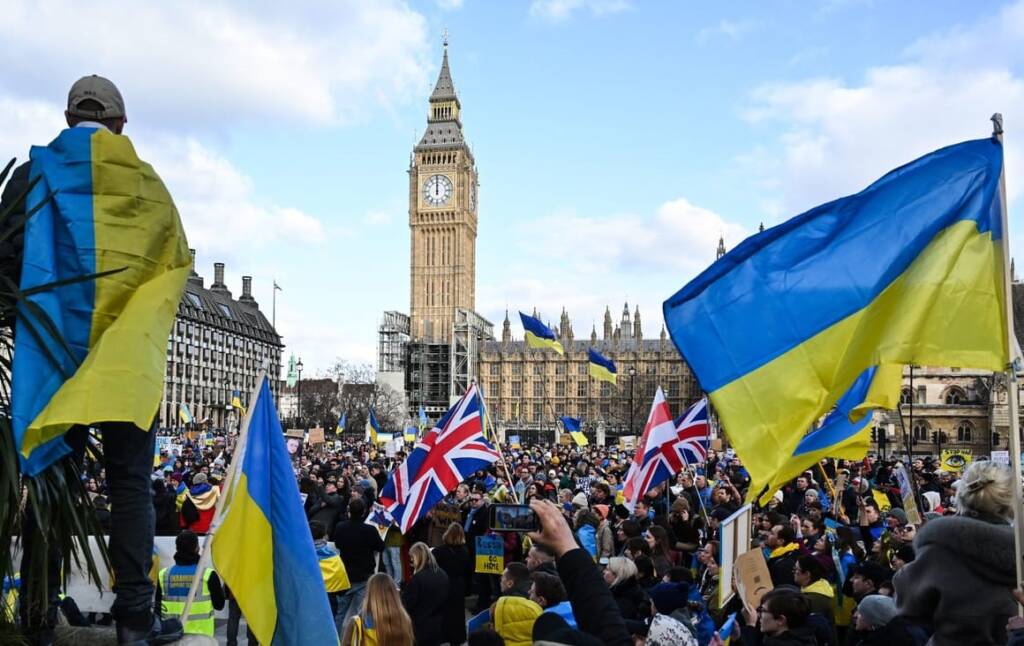What does the UK want in Ukraine? That’s something we need to ask more about, especially after their latest folly.
The United Kingdom’s approach to the Ukrainian situation oscillates between extremes of affection and aversion, presenting a fascinating paradox. While France emerges as Ukraine’s most fervent advocate, and Germany its most substantial financial ally, it is the British troops and leaders who find themselves directly on Ukrainian soil, offering guidance that straddles the line between wisdom and folly. This interventionist stance can trace its roots back to Boris Johnson, whose diplomatic maneuvers once led President Zelensky away from the negotiating table. Since that pivotal moment, the UK has embraced a role that might either shepherd Ukraine to victory or hasten its defeat, depending on one’s interpretation of events. Presently, the UK dispenses another contentious piece of advice to Ukraine, potentially provoking President Putin’s unrestrained wrath. This strategy, whether seen as audacious or imprudent, underscores the UK’s weird position in the geopolitical chessboard surrounding Ukraine.
Join us on Telegram: https://t.me/tfiglobal
In a twist that reads more like a chapter from a British Comedy than the somber pages of international conflict, British military maestros have pitched a novel approach to Ukraine’s defense playbook. According to a report by The Sunday Times, during a recent visit by British Defense Secretary Grant Shapps and Army Chief Antony Radakin, Ukraine was counseled to adopt a defensive stance in the east while unleashing targeted fury on Crimea and Russia’s Black Sea Fleet. This advice, seemingly torn from the annals of classic warfare yet infused with modern precision, suggests that Ukrainian forces should not overextend but instead, retreat to stronger positions when needed. This strategy aims to concentrate their might against the Black Sea and Crimea, leveraging Western long-range missiles that have already made their mark over the last half-year. Adding a layer of intrigue, a leaked conversation among German military officers, broadcasted by Russian media, reveals Britain’s more tangible support – with soldiers “on the ground” in Ukraine. These British forces are not just offering sage advice but are actively aiding in the use of Storm Shadow missiles. With a reach of 155 miles, these missiles bring the whole of Crimea within striking distance, laying bare the UK’s bold, if not brazen, commitment to Ukraine’s cause.
Read More: The UK is FLEXING its MUSCLES. It’s EMBARRASSING.
In the grand geopolitical theater, Crimea’s airspace and territorial integrity have long been inscribed by Russian President Vladimir Putin as the proverbial ‘red line,’ a boundary not to be crossed without triggering severe repercussions. Yet, in a bold defiance that might be mistaken for a script out of a high-stakes drama, Ukraine’s Western allies, notably the UK, have not only tiptoed but gallivanted across this line. With the aid of Storm Shadow missiles, Ukraine has orchestrated a series of audacious strikes on Crimea, seemingly undeterred by the specter of escalation. The plot thickens as British expertise extends beyond advisory roles, directly contributing to Ukraine’s naval victories in the Black Sea. Reports attribute to Antony Radakin, the UK’s naval strategist extraordinaire, the orchestration of tactics decimating Russian ships, thereby asserting control over the Black Sea.
This narrative unfolds against a backdrop of increasing Ukrainian forays into Crimea and even the Russian mainland, a strategic pivot reflecting a grim acknowledgment of the challenges on the conventional battlefield. Since the fall of Avdiivka, a strategic gem in Donetsk, to Russian forces, Ukraine has been portrayed as grappling with daunting shortages in manpower and armament, even as it makes these bold incursions. This shift towards high-impact, symbolic targets in Crimea and beyond is a testament to Ukraine’s resilience and the unyielding support of its Western allies, painting a picture of defiance in the face of adversity and altering the contours of conventional warfare.
